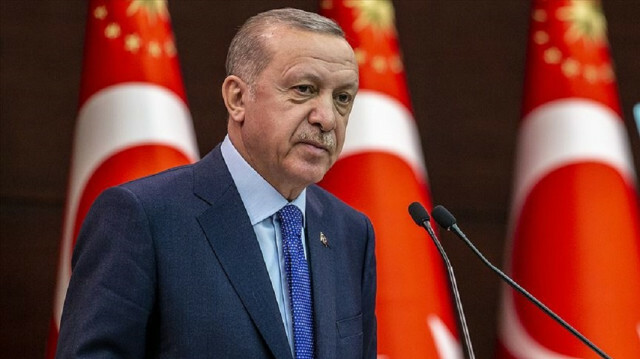
On informal Cyprus talks in Geneva this week, president says: 'I don't trust Southern Cyprus. They never acted honestly'
Turkey currently has enough COVID-19 vaccines, and no difficulties are expected in vaccine supplies, the nation’s president said on Friday.
In addition to current and incoming supplies of the Chinese Sinovac and European/US BioNTech shots, talk with Russia “are ongoing currently, hopefully, the Sputnik vaccine is coming, it will come," Recep Tayyip Erdogan told reporters after Friday prayers in the metropolis of Istanbul.
On additional supplies of the BioNTech shots, Erdogan also reaffirmed that German firm BioNtech – which partnered with the US’ Pfizer on the vaccine – had made a promise and that the jabs would be delivered to Turkey.
- Greek Cypriots ‘not honest’ in talks over island
Turning to this week’s informal Cyprus talks in Geneva, Erdogan said about the Greek Cypriot administration of Southern Cyprus: "I don't trust or believe Southern Cyprus. They have never acted honestly."
"Now the talks have been pushed back two or three months and I again don’t know that anything will be achieved. Because they never spoke truthfully," he added.
After the talks, Turkish and Turkish Republic of Northern Cyprus (TRNC) leaders told how Greek Cypriot administration officials pushed for discredited models for solving the island’s problems and also tried to deny how they had derailed previous negotiations.
The informal 5 1 talks – including both sides on the island, plus the guarantor states of Turkey, Greece, and the UK plus the UN – were meant to break the stalemate on the island and pave the way for future talks.
UN Secretary-General Antonio Guterres said on Thursday, the last day of the talks, that there is “no common ground yet” to resume formal negotiations on resolving the decades-old Cyprus problem.
Following the three days of informal talks, he added that he will convene another round of 5 1 talks to move the process forward.
Cyprus has been mired in a decades-long dispute between Greek and Turkish Cypriots, despite a series of diplomatic efforts by the UN to achieve a comprehensive settlement.
The island has been divided since 1964 when ethnic attacks forced Turkish Cypriots to withdraw into enclaves for their safety. In 1974, a Greek Cypriot coup aiming at Greece's annexation led to Turkey's military intervention as a guarantor power. The Turkish Republic of Northern Cyprus (TRNC) was founded in 1983.
The Greek Cypriot administration, backed by Greece, became a member of the European Union in 2004, although most Greek Cypriots rejected a UN settlement plan in a referendum that year, which had envisaged a reunited Cyprus joining the EU.

